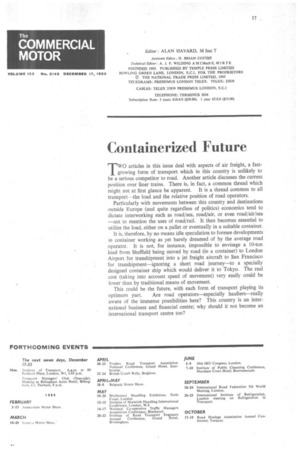Containerized Future
Page 19

If you've noticed an error in this article please click here to report it so we can fix it.
MWO articles in this issue deal with aspects of air freight, a fast ' growing form of transport which in this country is unlikely to be a serious competitor to road. Another article discusses the current position over liner trains. There is, in fact, a common thread which might not at first glance be apparent. It is a thread common to all transport—the load and the relative position of road operators.
Particularly with movements between this country and destinations outside Europe (and quite regardless of politics) economics tend to dictate interworking such as road/sea, road/air, or even road/air/sea —not to mention the uses of road/rail. It then becomes essential to utilize the load, either on a pallet or eventually in a suitable container.
It is, therefore, by no means idle speculation to foresee developments in container working as yet barely dreamed of by the average road operator. It is not, for instance, impossible to envisage a 10-ton load from Sheffield being moved by road (in a container) to London Airport for transhipment into a jet freight aircraft to San Francisco for transhipment—ignoring a short road journey—to a specially designed container ship which would deliver it to Tokyo. The real cost (taking into account speed of movement) very easily could be lower than by traditional means of movement.
This could be the future, with each form of transport playing its optimum part. Are road operators—especially hauliers—really aware of the immense possibilities here? This country is an international business and financial centre; why should it not become an international transport centre too?












































































































